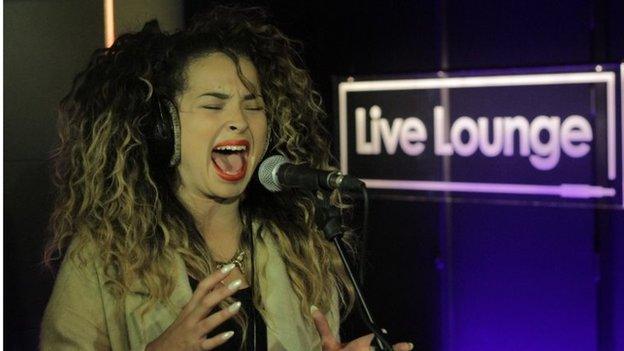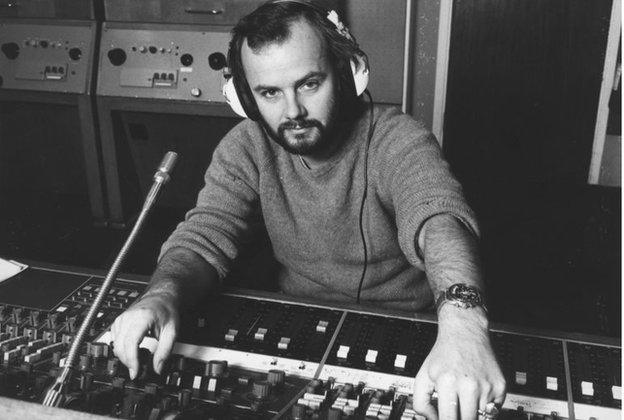Radio 1 to slash live music coverage
- Published

Radio 1's Live Lounge sessions are among the station's most popular features
BBC Radio 1 is to make dramatic cuts to its live music output, with the number of sessions by pop and rock bands dropping from 250 to 160 per year.
The station will also reduce the number of live events it covers from 25 to 10.
The BBC Trust has agreed to the changes, despite audience research showing "that live music is seen as a key strength of Radio 1".
It said the cutbacks would enable savings made necessary by the freeze on the licence fee in 2010.
Live music has been a component of Radio 1's output since its inception - with the likes of Led Zeppelin, Pink Floyd, Jimi Hendrix, Bob Marley, The Smiths, Nirvana, Pulp and The White Stripes playing at venues including Maida Vale and John Peel's family home in Great Finborough.
More recently, the "live lounge" strand on Jo Whiley and Fearne Cotton's show has seen the likes of Taylor Swift, Ed Sheeran, Arctic Monkeys, Katy Perry and Vampire Weekend playing covers of other artist's songs.
The cuts are expected to affect late night programmes and expensive, off-site broadcasts - such as recordings of concerts - rather than the live lounge and the station's Big Weekend festival.

The invitation to play a session for John Peel could make or break a band
Agreeing to the cuts, the BBC Trust said: "We expect Radio 1 to maintain a range of genres and artists within its sessions, including a mix of established and newer artists.
"We are also narrowing Radio 1's quota for coverage of major live events and festivals so that it excludes special editions of live sessions, and includes only BBC and third-party live events. It will reduce from 25 to 10 events."
Diversity target
The changes were revealed in a BBC Trust review of all of the BBC's music radio stations - Radio 1, 1Xtra, Radio 2, Radio 3, 6 Music and the Asian Network.
It gave the stations a clean bill of health, saying they were "viewed as high quality by audiences" and "represent good value for money for licence fee payers".
Analysis of the music played by each of the stations revealed they played "a wider range of tracks and genres than is available elsewhere on radio," it added.
However, the Trust - which is the BBC's governing body - challenged Radio 2 to increase the number of black, Asian and minority ethnic (BAME) listeners tuning in to its programmes.
It said only 12% of BAME adults aged 35 and over listened to Radio 2 last year, while the figure for all adults over 35 was 35%.
The Trust asked Radio 2 for an update on plans to address the disparity in six months time.
Among other decisions arising from the review were:
Radio 3 should minimise similarities with other classical music stations.
Radio 1 should do more to promote its advice programme and social action documentaries during daytime.
The number of new dramas on Radio 3 will be reduced from 25 to 20.
More documentaries should be shared between Radio 1 and its sister station 1Xtra.
A quota will be introduced to safeguard the amount of news and current affairs on Asian Network.
BBC radio should continue to develop its online strategy.
A fresh definition should be found for "new" music, as release dates become increasingly unclear in the online era. There should also be greater differentiation between new releases by established acts and newcomers.
Some 49% of the adult population listens to a BBC music station once a week, the Trust said. As a result, it plays "a vital role in the UK's music sector".
BBC Radio "could do more to demonstrate awareness of its market impact", it continued, and should meet with the UK music sector and commercial radio to keep them informed of future developments, particularly with regard to its online strategy.
The BBC said it "welcomed" the Trust's review and "its recognition that our stations are distinctive, deeply loved by their audiences and vital to the development of British music.
"We will implement the Trust's recommendations and will continue to champion UK music and culture whilst delivering a unique, high quality service to licence fee payers."
- Published12 March 2015

- Published4 March 2015

- Published26 February 2015
